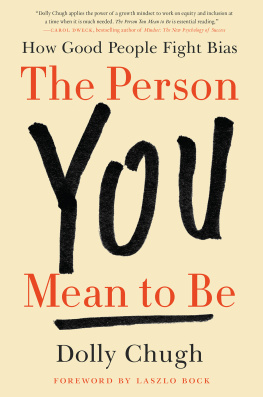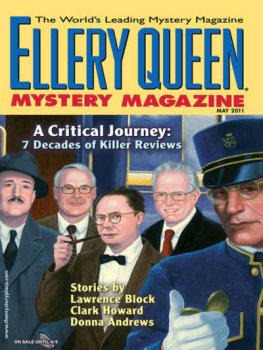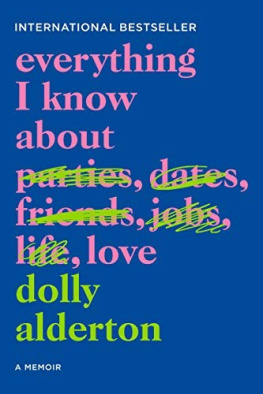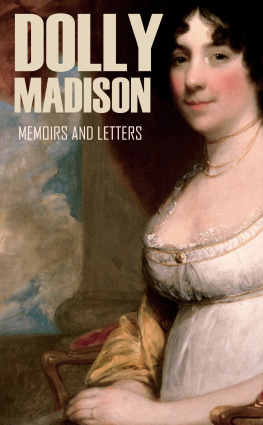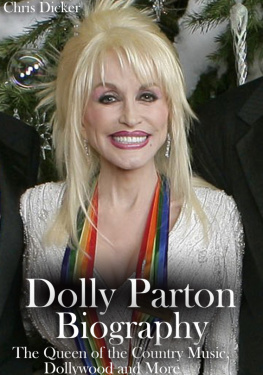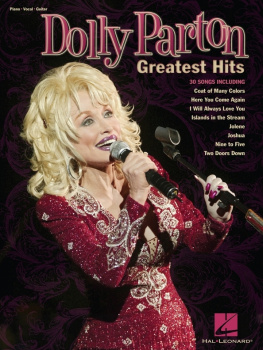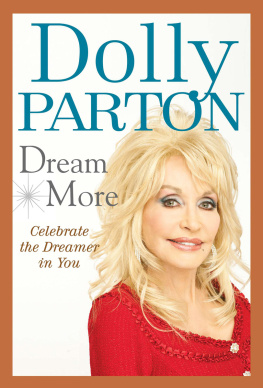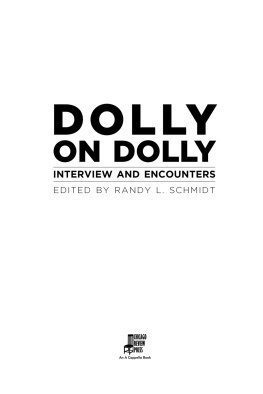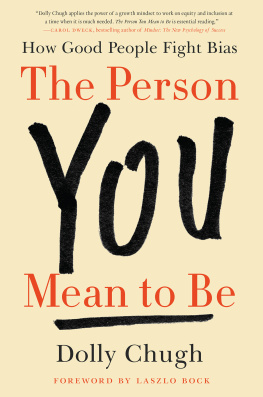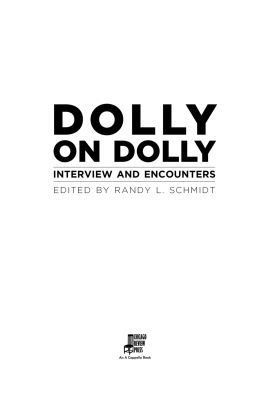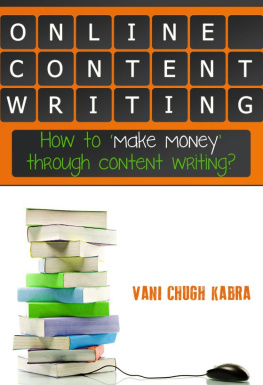Dolly Chugh - The Person You Mean to Be: How Good People Fight Bias
Here you can read online Dolly Chugh - The Person You Mean to Be: How Good People Fight Bias full text of the book (entire story) in english for free. Download pdf and epub, get meaning, cover and reviews about this ebook. year: 2018, publisher: HarperBusiness, genre: Science. Description of the work, (preface) as well as reviews are available. Best literature library LitArk.com created for fans of good reading and offers a wide selection of genres:
Romance novel
Science fiction
Adventure
Detective
Science
History
Home and family
Prose
Art
Politics
Computer
Non-fiction
Religion
Business
Children
Humor
Choose a favorite category and find really read worthwhile books. Enjoy immersion in the world of imagination, feel the emotions of the characters or learn something new for yourself, make an fascinating discovery.
- Book:The Person You Mean to Be: How Good People Fight Bias
- Author:
- Publisher:HarperBusiness
- Genre:
- Year:2018
- Rating:5 / 5
- Favourites:Add to favourites
- Your mark:
- 100
- 1
- 2
- 3
- 4
- 5
The Person You Mean to Be: How Good People Fight Bias: summary, description and annotation
We offer to read an annotation, description, summary or preface (depends on what the author of the book "The Person You Mean to Be: How Good People Fight Bias" wrote himself). If you haven't found the necessary information about the book — write in the comments, we will try to find it.
Dolly Chugh: author's other books
Who wrote The Person You Mean to Be: How Good People Fight Bias? Find out the surname, the name of the author of the book and a list of all author's works by series.
The Person You Mean to Be: How Good People Fight Bias — read online for free the complete book (whole text) full work
Below is the text of the book, divided by pages. System saving the place of the last page read, allows you to conveniently read the book "The Person You Mean to Be: How Good People Fight Bias" online for free, without having to search again every time where you left off. Put a bookmark, and you can go to the page where you finished reading at any time.
Font size:
Interval:
Bookmark:
For my family
In 2014 I was eight years into what would become almost eleven years as senior vice president of People Operations and a member of Googles management team. I was in the midst of hosting our first re:Work conference, a convening of 175 leading thinkers and practitioners in behavioral science, economics, and human resources. There had been a series of superb talks, but then something exceptional happened.
Dolly Chugh took the stage. She delivered a talk entitled Are We as Ethical as We Think We Are? She bounded up, introduced herself, and then, paraphrasing Lin-Manuel Mirandas musical, announced: I am thrilled to be in the room where it happens.
She had me at Hamilton.
And then she blew my mind.
Dolly asked: How can it be true that some of the time all of us act in ways that arent perfectly ethical, but amazingly every one of us believes him- or herself to be a good person?
Let that sink in.
All of us sitting there agreed that we were good people. I certainly was!
But. But. But.
I could think of moments of which I was less than proud. Maybe something as trivial as jumping ahead of the car that pulled up to the stop sign just before I did? Or using my body language to edge out the person who had lined up next to me to board a flight? Or that moment when Id read a homeless persons cardboard sign, but looked away before my eyes could rise to meet his face? Or when I saw something offensive online, wrote a bold comment in response, and then my finger hovered over the buttonfor so very longas I debated whether or not to post it?
If we are honest with ourselvesand I mean deep inside with that voice that no one else in this world except you will ever hearwould a truly, completely good person behave the way we do?
Spoiler alert: no.
The person I want to be, the kinds of people we all aspire to be, are better than we actually are.
And then Dolly made it okay:
The idea that were capable as human beings of perfect ethicality, of being as perfectly ethical all the time as we imagine ourselves to be, is a unicorn-like idea.... The truth is all of us sometimes inflate the invoice, or stereotype the student, or favor the friend.
That anguish I felt in the first part of her talk is universal. We all have an idea of who we believe we are, which stands in modest contrast to the person we actually are. The faint tickling of that disconnect, like the moment you first feel an ants tread halfway up your calf, is part of the human condition. Its normal. Natural. Commonplace.
But that doesnt mean its okay.
Because others see us not through the gauzy glow of our own self-regard, and not just through our words and actions, but also through the words and actions that we dont take. The latter is especially pernicious because of a little flaw weve all got in our brains called the fundamental attribution error.
Heres how it works. Think about the last time you were rushing through traffic, cutting lanes, zipping around the cars ahead of you. Maybe you couldnt wait to get to a party, or were late for the airport, or had a sick child to get to the doctor.
Now think about the last time some jerk cut you off on the road. (Dont those people just drive you crazy?)
This is the fundamental attribution error. When I do something thats aggressive or offensive toward you, theres a perfectly reasonable explanation. When I see you do something, its because deep down you arein my estimationjust that kind of jerk. I can know the factors shaping my actions, but because I dont know the ones shaping yours, I assume its just because of who you are. And I forget that you might also have a sick child.
If I fail to stand up for you, you are likely to perceive me as simply not caring. Or worse, that I condone or even agree with whatever bias or abuse youve just endured.
The Person You Mean to Be is Dollys road map from the messy, imperfect, conflicted person that each of us is today toward becoming a little more perfect, a lot less conflicted, and meaningfully more active and impactful on the world around us.
Dolly Chugh is one of those people whose rsum intimidates and overpowers. She was a varsity collegiate tennis captain, holds degrees from Cornell and Harvard, and worked in banking, consulting, and publishing before earning a tenured professorship at New York University. She still finds time to work with the faculty and leaders of the KIPP schools, volunteer in prisons, andas youll readsneak in a little holiday shopping for her family.
But if youre lucky enough to meet her in person, youll find someone so warm, gracious, generous, and laugh-out-loud funny that you cant help but want to be near her.
Dolly comes through in every page of this fantastic book. One of my favorite lines from The Person You Mean to Be comes just a few pages in: The person I mean to be stands up for [equality and equity and diversity and inclusion]. The person I mean to be fights bias. Sometimes, I do. Sometimes, I dont.
And then she proceeds to explain, drawing on research, anecdotes, and a bracing honesty and openness about her own life, how to take this reality and move from believer to builder.
She continuously surprises by describing concepts like cookie seeking, using it to explain why allies can inadvertently burden those feeling the weight of oppression just when that weight is at its heaviest. She reframes the discussion about growth mindset to introduce the best way to reactand build bridgeswhen you are at your most upset and defensive. And she arms the reader with a lucid narrative for explaining how so many of us benefit from ordinary privilege, including the simple fact of having white skin, or being straight, or being a man.
The benefit on this front, for many readers of The Person You Mean to Be, will be a deeper understanding of the science behind why bias exists, why society seems to tolerate so much of it, and why even 1 percent bias in a system leads to wildly disproportionate results for winners and losers.
The benefit for each and every reader, however, will be a path to self-acceptance and action.
Acceptance is vital to address all those moments of self-doubt and questioning, those instances when our fingers hover above the keyboards, or when we wonder if we have the standing to intervene when we see small slights in our daily lives. Accepting that these hesitations are universal means accepting that they are also unimportant. Everyone behaves imperfectly sometimes. Everyone pauses sometimes. Therefore, dont beat yourself up over it. Get on with acting.
Dolly offers a wide range of ways to act in the latter third of the book, but her message is a pragmatic one. We can still be good people, indeed we can be better people, as long as we do more. Not everything. Just more .
She shows how builders use whatever power and stature they have to amplify the voices of others, to encourage, to educate, and sometimes to confront. And she offers the reader clear, actionable techniques to do the same, often in the form of small nudges.
Google, for me, was a tremendous learning experience. One of the biggest lessons was about the power of nudges, a term coined by professors Cass Sunstein and Richard Thaler, and which I described in my own book as something that influences choice, but doesnt dictate it. At one point we observed that female engineers were being promoted at a lower rate than male engineers. At the time, engineers could nominate themselves for promotion, in addition to being nominated by their managers. We found that while women were slightly less likely to nominate themselves, when they did they were actually more successful than men in being promoted. We also found that with a small nudgean email from Alan Eustace, then senior vice president of engineering, to all technical employees describing this finding and encouraging women to nominate themselvesthe promotion gap went away.
Font size:
Interval:
Bookmark:
Similar books «The Person You Mean to Be: How Good People Fight Bias»
Look at similar books to The Person You Mean to Be: How Good People Fight Bias. We have selected literature similar in name and meaning in the hope of providing readers with more options to find new, interesting, not yet read works.
Discussion, reviews of the book The Person You Mean to Be: How Good People Fight Bias and just readers' own opinions. Leave your comments, write what you think about the work, its meaning or the main characters. Specify what exactly you liked and what you didn't like, and why you think so.

